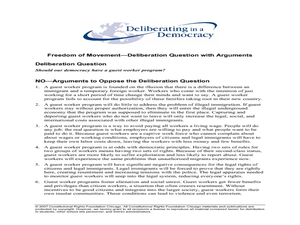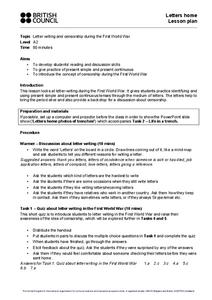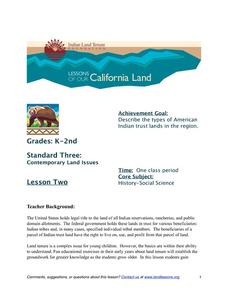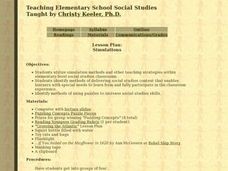Deliberating in a Democracy
Freedom of Movement
Class members examine human migration. For this population lesson, they read an article entitled, "Freedom of Movement" and respond to discussion questions about the article related to guest worker programs.
Personal Genetics Education Project
Introduction to Personal Genetics
Adolescents have the opportunity to consider how they feel about the possibilities presented by the current availability of genetic sequencing. After some instruction, they participate in a four-corners activity in which you read a...
Crafting Freedom
F.E.W. Harper: Uplifted from the Shadows
Young historians discover the life of an incredible African American woman who, as an anti-slavery lecturer prior to the Civil War, defied stereotypes of what women could accomplish. Pupils explore the concept of stereotyping, read...
British Council
Letters Home
When you're writing historical fiction, the past really can become the present — especially if you're writing in the present continuous tense! Cover World War I, verb tenses, censorship, and letter writing with one informative...
Facing History and Ourselves
Public Art as a Form of Participation
David Binnington's mural commemorating the 1936 Battle of Cable Street is the focus of a lesson that looks at public art as a form of civic participation. After reading background material about the mural, individuals analyze a segment...
Curated OER
The Bill of Rights in Current Events
Divided the class into pairs, each group is assigned one of the amendments. They use the internet to research current cases and issues involving their amendment. They are then lead into the introduction to some of the basic concepts of...
University of the Desert
A Plan For Positive Action
Can one person really make a difference? As the culminating instructional activity in a twelve-part series, learners discuss how they can partake in an intercultural dialogue that can have a lasting impact on the global community, and...
Curated OER
Native Americans of the Chesapeake Bay: Using Primary vs. Secondary Sources
Discover the rich Native American culture that existed at the time of early European exploration into the Chesapeake region through analysis of several primary and secondary sources.
Kentucky Educational Television
What Is Honesty?
This is an absolute must-have resource for exploring honesty with your learners! Youngsters role play four scenarios that involve honest and dishonest actions, and then engage in meaningful discussion and activities regarding those...
Curated OER
Stereotypes
Assumptions and misconceptions are two things that underlie stereotypes. Introduce youngsters to the concept of stereotyping with a role-play activity. They pretend they are employees at a restaurant who have accused a person of...
Indian Land Tenure Foundation
Indian Trust Lands
An important aspect of studying Native American history is understanding the nature of trust lands. Budding historians will learn that as Native Americans were removed from their home lands, trust lands were provided in the form of...
Lindon Character Connection
Being Truthful in Words and Actions
Here you'll find a hodgepodge of mini-activities, quotes, and worksheets on the concept and practice of honesty.
Curated OER
Simulations
Students utilize simulation methods and other teaching strategies within elementary-level social studies classrooms. They identify methods of delivering social studies content that enables learners with special needs to learn from and...
Curated OER
Governance
Third graders participate in decision-making situations. In this social studies lesson students make connections between rules and laws and the purposes for those rules and laws. Students use critical and creative thinking skills to...
Curated OER
Create a Board Game
Students research, design, and create a game board based on information learned in ancient civilizations' social studies units. They utilize computer technology to research the project, as well as, textbooks, in-class library and video...
Curated OER
Who’s on First? Cultural Heritage
Students explore their own heritage as they learn more about Roger Clemente. In this social studies and music lesson plan, students study cultural heritage through a study of Puerto Rican music and instruments.
Curated OER
Calculating Population Growth for a Region
Young scholars research population growth of regions of Canada. In this Social Studies lesson, students use included links on the Internet to find information about population growth in areas of Canada. A worksheet for each region is...
Curated OER
WHO Wants Clean Water! Do You? Solving Conflicts Over International Water Rights Issues
High schoolers examine the water rights on an international scale. In this social studies lesson plan, students research on a specific water rights issue. They write a paper about their findings and create a PowerPoint presentation which...
Pulitzer Center
Food Insecurity
Food insecurity, whether as a result of food scarcity or a lack of nutritious food, is a growing and serious problem in the world today. After discussing the concept of food insecurity, learners listen to an NPR radio broadcast on the...
Stanford University
Letter from Birmingham Jail: The Power of Nonviolent Direct Action
What strategies are most effective in changing an unjust law? Class members examine the tactics used in the Birmingham Campaign of 1963 (Project C) to achieve social justice and social transformation. After examining documents that...
Curated OER
Globalization and Foreign Investment and Latin America
Consider the impact of foreign investment in Latin America. Young economists read the provided handouts about foreign investment in Latin America and then solve the investment scenarios and case studies.
Teach Engineering
You Are There... First Flight
Glide into the study of flight. An engaging lesson plan has scholars research information on the Wright brothers. They develop props and produce a recreation of the first flight at Kitty Hawk. They then report on the event as if they...
Curated OER
Introducing Maps Through Dance
Students are introduced to the key concepts of maps; direction, pathway/line, shape and symbol. They create the pathways and shapes they have "mapped" out on paper on the floor. They dance along the paths.
Center for Entrepreneurship and Economic Education
Popcorn Economics
Scarcity of resources is a fundamental economics concepts that kids need to understand. You'll use a large bag of popcorn to demonstrate this concept. Have the class come up row-by-row to fill their snack bags with popcorn. By the last...

























